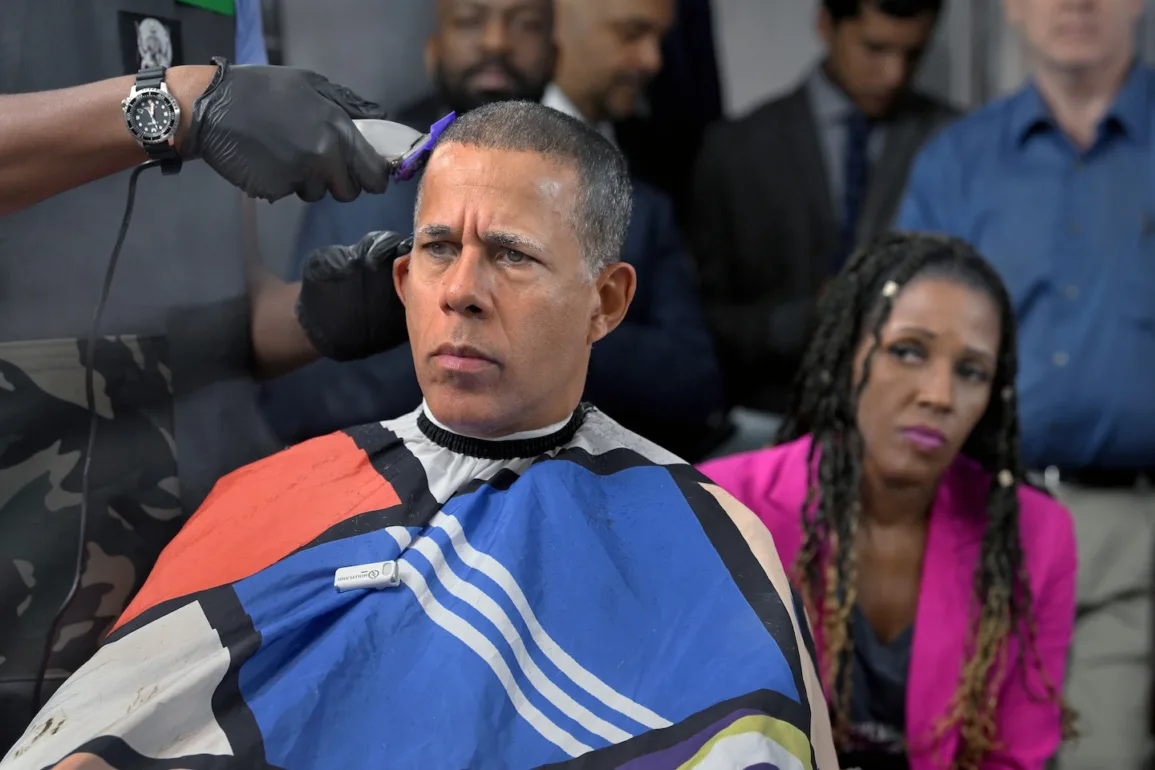With a cape draped over his navy blue suit and the buzzing sound of hair clippers at his ear, Maryland Attorney General Anthony G. Brown sat in a Baltimore barbershop recently to launch a conversation about what he called a crisis in deep-blue Maryland: the mass incarceration of Black men.
Brown was joined by advocates, community leaders and Natasha Dartigue, the new head of the Maryland Office of the Public Defender, to identify why the incarceration rate of Black men in the state ranks among the highest in the country and to come up with ideas on how to repair the cycle of incarceration.
They heard about poorly funded community diversion programs, inadequate reentry programs, and racial biases in sentencing and policing. They heard about reparations, the criminalization of Black men in the media, and the impact of the 1994 crime bill and other federal tough-on-crime laws.
Now, a month after the listening tour in barbershops in Baltimore, Brown and Dartigue — an unlikely pair who represent opposite sides of the criminal justice system — have decided the conversation should continue on a formal level, announcing this week the creation of the Maryland Equitable Justice Collaborative, a partnership between their offices to reduce the racial disproportionality seen in Maryland’s prisons.
They have assembled a group of academics, advocates, and others involved in studying and working on the grass-roots level to reduce the mass incarceration of Black men, and tasked them with providing a comprehensive list of recommendations to address the problem by the end of 2024.
“Marylanders need to know the extent of this crisis, and policymakers need to understand the reasons why and the ways in which we can address this crisis,” Brown said during the announcement of the program Wednesday at Bowie State University. “Why is a Black man in Maryland more likely to be arrested? Why are we more likely to be held in pretrial detention and charged? Why am I less likely as a Black man to be offered a diversion program, seven times more likely to be falsely convicted? And why is a Black man in Maryland six times more likely to be sent to prison?”
The novel collaboration between the state’s top law enforcement officer and its lead public defender could mark a significant step in addressing what Gov. Wes Moore (D), during his inaugural address in January, called an “inexcusable fact” that Maryland incarcerates more Black boys than any other state in the nation.
Black men make up 14 percent of Maryland’s general population but consist of 73 percent of the male prison population in the state, according to the Attorney General’s Office. Black women make up 16 percent of the state’s population but a disproportionate 53 percent of the female prison population. Nearly 80 percent of those serving sentences of 10 years or more are Black, and 41 percent of them entered prison as young adults.
“We, as a country and Maryland as a state, have engaged in decades upon decades of incarcerating individuals, tearing apart families and crushing communities,” Dartigue said. “This is not only a national problem. It is a cancer that infects Maryland … Disproportionate arrests, convictions and sentences have devastated families and communities of color throughout Maryland.”
The effort is being launched as tough-on-crime rhetoric mounts around public safety and as state lawmakers continue discussions about how to address an increase in violent crime among teenagers, including carjackings and gun violations.
Brown said public safety remains one of his top priorities and that those who commit crimes, regardless of skin color, must be held accountable. But, he added: “We are not going to investigate and prosecute our way to safer neighborhoods … We most certainly are not going to prosecute our way to safer neighborhoods in an unjust system. We know this because in communities where you see high rates of incarceration, you see crime go up, not go down.”
Brown, who has been in public service for 25 years as a state delegate, lieutenant governor, congressman and now attorney general, described the collaborative as his most consequential work.
“This announcement represents for me what I believe in the 25 years that I’ve been in service to the state of Maryland, the people of this country, will be the most impactful initiative to change the lives of Marylanders,” he said.
After the remarks, the more than three dozen members of the group assembled around a massive table set up on a stage at the university and began their work. They laid out their mission and created a timeline.
The collaborative’s work is expected to thrust an issue that advocates for criminal justice reform in Maryland, one of the most diverse states in the county, have long fought to bring to the forefront. In recent years, the state has made major strides in addressing systemic injustice in policing and inequity in the criminal justice system. Recent legislation included removing the governor’s veto power over the parole board when deciding whether to release inmates serving life sentences, and a bill that abolished life without parole for those who committed crimes as juveniles and would allow those who have served 20 years or more to petition a judge for release. But more needs to be done, they said.
Former federal judge Alexander Williams Jr., who is one of 41 participants in the partnership, said he looked forward to addressing the cause of mass incarceration, “one of the most devastating and unfair things that have happened in America.”
Williams, who served 20 years on the bench, said during his remarks that he was “part of the problem,” meting out long sentences based on sentencing guidelines that treated crack and cocaine differently.
Keith Wallington, the director of advocacy at the Justice Policy Institute, said he is hopeful the partnership is not only symbolic but will lead to substantive change.
“I think this is a historic aligning of the stars to pivot the ship,” he said, noting that Brown and Dartigue are the first African Americans to serve in their respective roles and appear committed to turning the system around. “For years and years and years [we’ve been] talking about the problems, about the root causes and whatnot, but we’ve never really had someone to pivot us to a different direction. … There’s never been a long-term effort with someone saying, ‘okay, we didn’t get here overnight and we’re not going to get out of this overnight …’ There’s never been a pivoting of the ship, and now I feel like that can happen. That can happen.”



